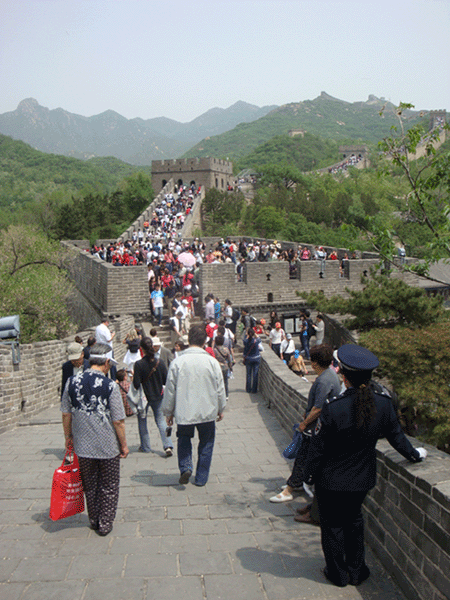The Great Wall of China
 |
|
At Badaling, you can choose to hike the wall going east or west[China.org.cn] |
◇ Why is the Great Wall number one?
Hands down, the Great Wall of China is one of, if not the best thing to see while in Beijing. This cultural icon isn't important centrally to Beijing, but serves as a national icon for all of China. The wall can serve many different purposes for many different people. Because of the wall's ability to transform the present into the past, the immense history its very present lends, and flexibility of options, the Great Wall simply reigns supreme.
◇ What should you know before you go?
The "original" wall was built over 2000 years ago during the Qin Dynasty (221-206 BC), these were separate walls built by independent kingdoms (during the Warring States' Period) and then unified together to form one wall. The effort to combine these walls required hundreds of thousands of workers who came together to keep out marauding nomads along the border. Legend has it that along with the packed earth that makes up the core of the wall, deceased soldiers' bones are also housed inside the core.
Most of the sections of the wall that are left were built during the Ming Dynasty (1368-1644), due to their use of bricks as fortification instead of rammed earth. They also gave the wall a great facelift, with some 60 million cubic meters of bricks and stone slabs; the Ming wall addition was in itself a 100 year construction project.
Watchtowers were added along the wall, usually in two bow shots lengths. These served as viewpoints to check enemy movement. Guards would light a series of fire signals, fueled by wolf dung, in order to get messages about the enemy to Beijing at lightning speed.
Though the popular myth of "You can see the Great Wall from outer space" is one that has raced through pop culture over the years, it has been proven false. The wall, at maximum width is only 9.1 meters (or 30 feet) and is relatively the same color as the surrounding soil. In order to be visible from the moon, an object must be at least 112 kilometers (70 miles) wide and of contrasting color to its surroundings. Scientists have equated the width of the wall to a human hair and the myth of being able to see that exact human hair from over 3.2 kilometers (2 miles) away. However, with near perfect conditions the wall can be seen from low Earth orbit, or with an altitude of as little as 160 kilometers (100 miles) away.
◇ Where should you go?
The Great Wall has many easily accessible sites near Beijing that are open to tourists year round.
Most tourists visit Badaling Great Wall and with the new expressway from Beijing, this is only a 65 minute ride by bus. Badaling is the most reconstructed section of the Great Wall and is meant to show the wall in its most idealized form: as the Mings would have originally envisioned it. This section was originally built in 1505 on the same pass as the Juyongguan section, showing just what a critical defense point this was for Beijing. In my experience, Badaling is a great introduction to the Great Wall and is very accessible to those who are short on time or not big into hiking. (Make no mistake, this wall means business, so bring appropriate shoes and water when you come.)
The steep hike up to the wall is lined with souvenir stalls and shops selling water and "I climbed the Great Wall" tee-shirts. Once you get to the top, the ticket counter is right before the wall and you are hit with the last bit of souvenir commerce before the hike. Though Badaling is a little crowded initially, visitors can go one of two ways, and the further you walk, the more sparse people become. The number one criticism I would give this place is the reconstruction of the wall becomes a turn off once you reach the end of the hiking sections. Travelers are met with an ending point marked by a granite slab. Just beyond this is the authentic, un-reconstructed Great Wall teasing travelers to keep going, but keeping them from progressing.
Badaling was the first section of the wall open to tourists and sees millions of visitors annually. Admission is 45RMB and includes a 15 minute film about the wall. From town, take the Bus 919 from Deshengmen station (12 RMB).
If you have a little extra time on your hands and feel the call of wild adventure (like me), you would probably be better off choosing a site more like Jinshanling or Simatai. These sections do not have the crowds that Badaling has, and the wall itself isn't as pristine and new. It isn't unusual to have some real one-on-one time with sections of this wall, being the only hiker for as far as the eye can see. According to the Lonely Planet guidebook, the hike from Jinshanling to Simatai is the number 5 best hike to do in China, and I am inclined to agree. This has been my number one favorite thing I have done in China and it gives travelers a unique paradox experience with the Great Wall as it dances across the mountain tops and the endless greenery of the surrounding countryside. It isn't hard to let your imagination go to work here, conjuring up images of the hundreds of thousands of men whose sweat and labor went into such an important cultural symbol for China.
If arranged in advance, travelers can explore the hike between Simatai and Jinshanling. It is only about 10 kilometers (6 miles) but can take all day because of the treacherous terrain. Hostels are at either end point of the hike and may be a considered factor in your visit, turning this into a weekend trip. Bringing water as well as light food and good shoes are a must for this trip, especially during the hot summer months. I did this trip last weekend. It was so enjoyable, I would gladly take off now and do it again.
Other sites where visitors can visit the wall around Beijing include: Mutianyu, Juyongguan, Jiankou, and Huanghuacheng.
◇ Get out there!
So now that you have the scoop on everything you should know before taking off to the Great Wall, all you have to do is get out there! There are plenty of places along the Great Wall near Beijing to suit any level adventurer, from the wee small to the rugged backpacker. No matter where you go, be sure to bring water and good shoes. Although, this wall is lined with bricks, it is no yellow brick road. Inclines are steep and at times dangerous; remember that the wall was built as a defense system across mountainous terrain that should stop enemy invaders naturally, construction reflects that.
(Tours to the wall can also be paired with tours to the Ming Tombs.)
(China.org.cn August 24, 2009)
 0
0 







